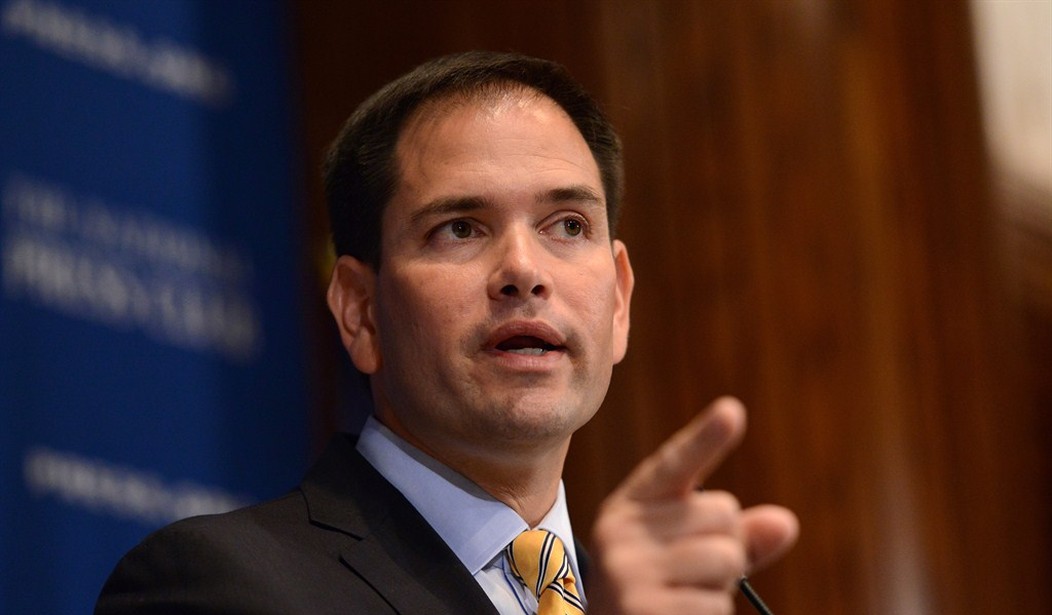I meant to get around to this yesterday, but given the flurry of events surrounding Marco Rubio's political future and the incipient 2016 GOP field beginning to take form, it still seems quite relevant. Florida's junior Senator appeared on Hugh Hewitt's radio show earlier in the week and
Advertisement
He handled questions about Iran's nuclear program with fluidity and conviction, then shifted into politics mode when Hewitt's line of questioning turned to the early presidential race. His responses about "running against" Jeb, Hillary Clinton's vulnerabilities, and the headline-grabbing addition to his political team seemed prepared and vetted. As if he's a man gearing up for a national race, as has been reported for several weeks. He also told Hewitt that he will "absolutely" need to make his intentions clear very soon. Here's one passage of the on-air discussion, though, that I think may present problems for him moving forward:
I think [American voters] also hopefully look for someone who has more of a track record than just a handful of years as a backbencher in the state legislature followed by a handful of years in the Senate, not having, not really doing anything serious about any major issues. As I look at my own considerations, I’m reminded that I served nine years in the Florida legislature, the third-largest state in the country. I was its presiding officer for two years, and also ran the Florida House from and administrative point of view, served four years in the Senate where I have dedicated significant amount of time to both travel and study and actually involved in shaping the policies on everything from the Western Hemisphere to policies in Asia... But look, the biggest problem with Barack Obama is you know, he was elected on the notion that here was this young candidate that was going to bring about generational change in our policies, and then got elected and basically pursued the same tired, big government ideas of the last 60 years.
Recommended
Advertisement
Rubio knows this knock against him is coming, so he's testing out ways of parrying the inevitable Obama/inexperience comparisons. If voters are looking for someone with a deeper track record than some years as a state legislator, followed by a brief US Senate career, wouldn't that tend to disqualify...Marco Rubio? Not really, he argues, because he was in the Florida legislature (a big state, he notes) for nine years -- including in leadership -- and has spent double the amount of time doing his job, educating himself and influencing policy in the Senate than Obama did (who became a full-time presidential candidate after just two years). Plus, Obama's worldview is all wrong, he concludes. Rubio won't have a hard time selling Republican voters on that last bit, but on the other elements, having served slightly longer terms as a state legislator and Senator doesn't seem like a particularly substantive difference to highlight. That issue won't go away, and it's not an easy challenge for Rubio to satisfactorily answer. The same dilemma applies to Ted Cruz and Rand Paul, by the way. As I mentioned in my January analysis of Rubio's presidential maneuvers, Florida state law and Rubio's stated intentions dictate that he would abandon the pursuit of Senate re-election if he runs for the White House. This could complicate the GOP's efforts to retain the upper chamber in 2016, when Democrats would need to net at least four seats for a takeover. An open seat in Florida would look juicy to the DSCC. On that front, Republicans got some encouraging, if
Advertisement
[N]ew polling data out Tuesday shows the GOP begins the cycle in a strong position in three of those states — if the party’s first-term incumbents stand for reelection instead of joining a national ticket. New Quinnipiac University polls show more voters in Florida, Ohio and Pennsylvania — states central to the parties’ strategies in the battles to control both the White House and the Senate in 2017 — think their GOP senator deserves reelection than think he doesn’t.
These Q-polls show Rubio, Ohio's Rob Portman and Pennsylvania's Pat Toomey commanding strong job approval ratings (above water by double digits), with voters saying that each deserves re-election by fairly comfortable margins. Interestingly, Toomey is in the strongest position at this stage. But Pennsylvania is a blue state in presidential years, and he barely squeaked by in 2010, so he'll have his work cut out for him. Other potentially endangered Republican incumbents include Illinois' Mark Kirk, New Hampshire's Kelly Ayotte and Wisconsin's Ron Johnson. At the top of the GOP's target list is Harry Reid, who says he will be running again in 2016. Reid, who survived a close call in 2010, has some work to do: Picking up the
Advertisement
























Join the conversation as a VIP Member